QuestionHi Chrys,
I bought him from a breeder and have had him for about 2 months. He was hand fed. I can only hold him wearing gloves and have to keep all skin covered. If I were to take them off he'd be constantly biting. He was perfectly fine the day I brought him home then started biting over the next few days. I contacted the breeder and she said he didn't bite like that when she had him. He wants to be on people all the time. He isn't content to sit in his cage. I feed him Nutriberries as his main food and give him fruits and veggies also. Hope this helps. :)
-------------------------------------------
The text above is a follow-up to ...
-----Question-----
I have a 4 month old Green Cheeked Conure that loves to bite. If he sees uncovered skin he bites it and hangs on for dear life. It doesn't matter where I am, near his cage, away from his cage, etc. He just does it. He's obsessed with skin. What makes it worse is that he wants to be held constantly. I've resorted to wearing gloves when handling him because he will just keep biting. I've tried putting him on the floor, putting him back in his change, shaking my hand, all the things the books suggest. Do you have any other ideas?
-----Answer-----
Hi, Melissa. Thanks for posting!
Was your conure handfed as a baby (is this bird supposed to be tame)? How long have you had him? What type of daily diet is your bird on? Did you purchase this bird from a breeder, pet shop, other? I don't understand how you can "hold" your bird, but he constantly bites...please explain as I'm confused by some information in your post.
If this bird wasn't handfed as a baby, he likely isn't tame, which explains the biting. I need more details about what's going on in this situation in order to be able to help you.
Thanks.
Chrys
AnswerHi again, Melissa. Something must have happened once you brought this bird home for him to go from being a handfed, tame bird, to where he is now. A handfed bird normally loves fingers/hands, as baby birds grow to love fingers during the handfeeding process OR the breeder lied to you about the bird being tame and handfed. Was there some incident in your home right after you purchased him where he became frightened by your hands/fingers? Could it be that the bird is frightened of gloves and not necessarily your fingers/hands? Tell me how you go about bringing the bird out of it's cage (or do you allow the bird to come out on it's own)? This bird has learned that biting gets him what he wants and he's capitalizing on your fear of him biting you. He probably gets on your shoulder and then when you want him to come down, he bites at you, and you allow him to get away with this biting. Obviously, he likes people or he wouldn't want to be on people all the time. Therefore, I believe he has just learned that biting gets him what he wants, you allow it, so he continues to do so.
What happens a lot of the time is that when a new bird is brought into the home, the bird is frightened of it's new surroundings, stressed out by the move, frightened by the new people in it's life, etc. Without giving a bird time to settle down in it's new environment, new owners tend to want to get their birds out and have them sit on their fingers, show them off, etc., which is usually too soon after the move. The bird may show it's fear, stress by biting. The new bird owner of course becomes frightened by the biting behavior and each time the bird tries to bite or actually bites, their human pulls back to avoid being bitten. This is normal. However, it teaches a bird that biting gets them what they want, so the bird continues using this method to get his/her way. Then it's just a viscious circle and no one is happy with the situation.
Diet - Nutriberries...I do not consider nutriberries to be a good diet. These should be left for snacks or treats. They contain mainly seed held together with corn syrup and many chemicals added (which are described as vitamins, minerals, etc.). Your conure needs to be on a primary diet of veggies, fruits, whole/multi grain items...a healthy, nutritional daily diet, which also includes pelleted food. This could have a big bearing on your conure's behavior. Seed is high in fat and has little nutritional value. Visit my website for more information on diet:
http://www.angelfire.com/falcon/birdinfo/index.html
In order to get past this, you need to show your conure that his biting will get him nowhere with you. This might be painful for you as you'll get bitten at first, but you need to show your bird that biting isn't where it's at with you! And then there's certain things you should/shouldn't do. In other words, don't put your hand inside your conure's cage when you try to bring him out. Let him come outside his cage on his own. Avoid situations where you know it will result in biting behavior. For example, don't allow your bird on your shoulder if a biting incident will result when you need him to come down from your shoulder. If/when he does get on your shoulder, force him off by moving close to his cage and forcing him to climb down on his cage on his own OR have someone else take him off your shoulder by picking him up (parrots like to get in the middle of a person's back where the person can't reach them). ALWAYS reward your conure (with the nutriberries) when he behaves positively and NEVER reward your bird for negative behavior. For example, when your bird bites, give him a time out in his cage for about 5 minutes. Then allow him back out again. You basically need to retrain your bird that biting isn't acceptable, but you'll need to take a few bites in the process of retraining him. You also need to take care and not confuse your bird. You need to have definite boundaries and stick by those boundaries. Don't pull your hand back when he bites/tries to bite. You may do this as an immediate reaction, but put your hand right back! This will show him that it doesn't do any good. Kind of like when you fall off a horse...you have to get right back on that horse! You need to have control over your bird, not vice versa.
Take one step at a time and come back for help as you need to. You can get through this and have a great conure with time and patience. Things aren't going to get better over night. Really think about the diet thing...the proper diet can make a world of difference in a parrot.
Chrys

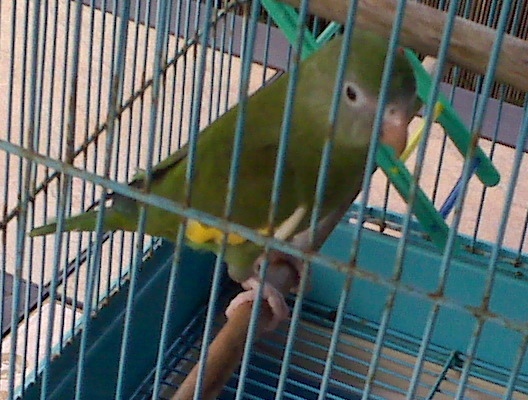 What type of parrot is this?
Question
Friendly bird
A week ago ths small parrot flew
What type of parrot is this?
Question
Friendly bird
A week ago ths small parrot flew
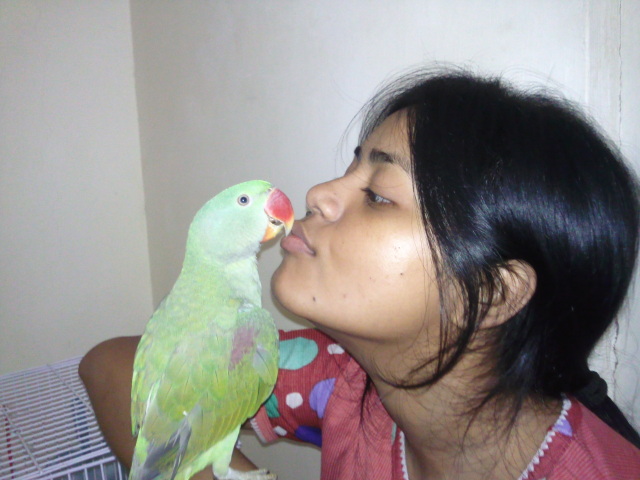 can i give my parrot chole(chana) called in hindi
Question
my little chaddi alexa
dear sir,
can give chan
can i give my parrot chole(chana) called in hindi
Question
my little chaddi alexa
dear sir,
can give chan
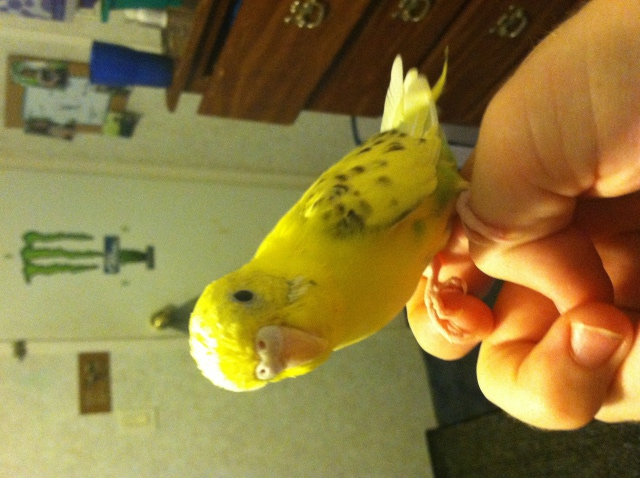 Parakeet gender
Question
Parakeet
Hi, I looked for an expert und
Parakeet gender
Question
Parakeet
Hi, I looked for an expert und
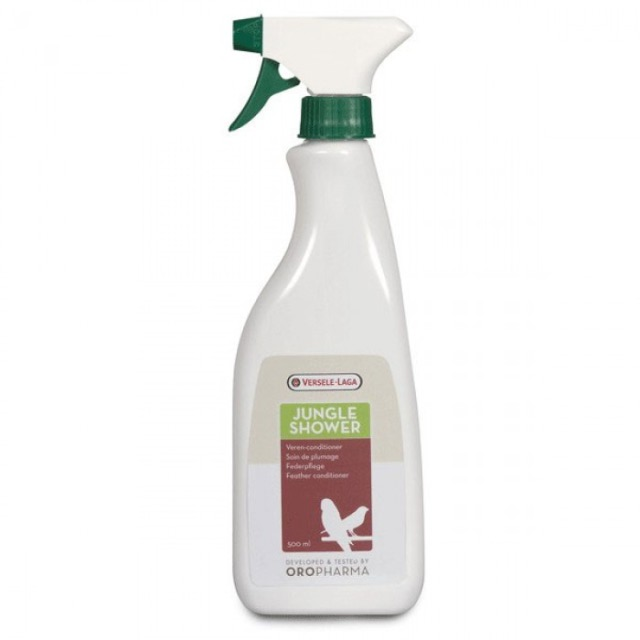 Indian Ringneck Health Issue
QuestionI have an Indian Ringneck who had been neglecte
Indian Ringneck Health Issue
QuestionI have an Indian Ringneck who had been neglecte
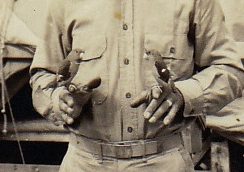 ID Birds
Question
Panama Birds
My uncle served in Panama in 1941
ID Birds
Question
Panama Birds
My uncle served in Panama in 1941